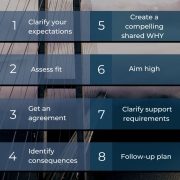Employee Engagement: It’s Not Rocket Science, But It Is Science
The Gallup Q12 is a survey designed to measure employee engagement. The instrument was the result of hundreds of focus groups and interviews. Researchers found that there were 12 key expectations, that when satisfied, form the foundation of strong feelings of engagement. So far 87,000 work units and 1.5 million employees have participated in the Q12 instrument. Comparisons of engagement scores reveal that organizations with high Q12 scores exhibit lower turnover, higher sales growth, better productivity, better customer loyalty and other manifestations of superior performance.
The Gallup organization also uses the Q12 as a semi-annual employee engagement Index – a random sampling of employee across the country.
The engagement index slots people into one of three categories:
- Engaged employees – Work with passion and feel a profound connection to their company. They drive innovation and move the organization forward
- Not-Engaged employees – Are essentially “checked out.” They are sleepwalking through their workday. They are putting in time, but not enough energy or passion into their work.
- Actively Disengaged – Employees aren’t just unhappy at work; they’re busy acting out their unhappiness. Every day, these workers undermine what their engaged coworkers accomplish.
The results of the latest engagement index: Engaged employees – 28 % Not-engaged employees – 54% Actively Disengaged – 17%
In other words, 71% of the workforce is either under-performing or actively undermining their work.
The Q12 Index: Here are the questions:
- Do you know what is expected of you at work?
- Do you have the materials and equipment to do your work right?
- At work, do you have the opportunity to do what you do best every day?
- In the last seven days, have you received recognition or praise for doing good work?
- Does your supervisor, or someone at work, seem to care about you as a person?
- Is there someone at work who encourages your development?
- At work, do your opinions seem to count?
- Does the mission/purpose of your company make you feel your job is important?
- Are your associates (fellow employees) committed to doing quality work?
- Do you have a best friend at work?
- In the last six months, has someone at work talked to you about your progress?
- In the last year, have you had opportunities to learn and grow?









